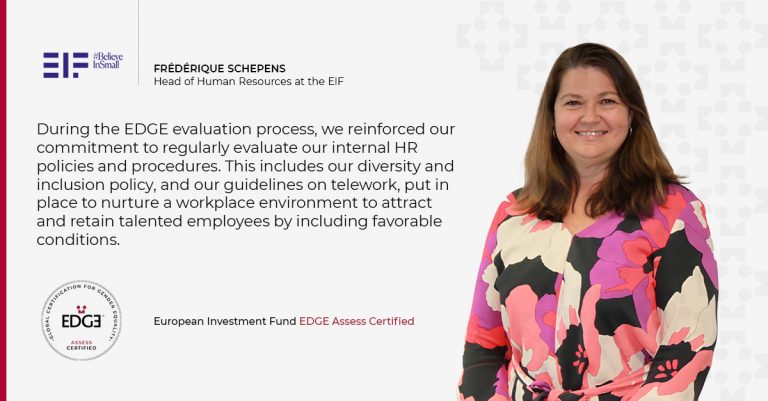How did the business case for gender balance D&I evolved over the 18 months? How did the conversation around the business case evolved/ What changed/ What was expanded/ What is considered no longer current?
Frédérique Schepens: Gender equality has been a key principle of the EU since the provision on equal gender pay for men and women was introduced in the Treaty of Rome back in 1957. At the European Investment Fund (EIF) our Diversity and Inclusion Policy reinforces gender and equal pay as one of the cornerstones of our organization. Our D&I policy which was introduced in 2018 and revised in 2021, sets out ambitious and realistic goals to be cascaded throughout our departments, starting at the recruitment phase and up to management level.
The EIF began its journey together with EDGE in 2020 in a bid to strengthen our policies and practices from a gender perspective. A conscious effort has been made to help qualified female candidates break through the glass ceiling, and EIF management has been paying special attention to continuously support the cause of female advancement by encouraging women to assume increased responsibilities and apply for management positions. With the assistance of an external assessment center, we targeted a selection of heads of units, and gave them the valuable opportunity to focus on their development gaps, and to have a serious development discussion with their manager in order to better prepare them for future management positions. During the past few years, we have also sent a few female managers to participate in an external cross-mentoring program, and we are looking at ways to expand the impact in 2022. Although with some way to go, we are pleased to measure an increase in the number of females in both management and professional functions levels as of date.
In a bid to eliminate bias from the very start of the recruitment process, in 2021 HR drafted a short guide for recruiting managers to encourage them to see past their unconscious bias. This guidance is now systematically shared with hiring managers during the launch of each recruitment campaign. In addition, there is a clear emphasis on the need for the list of candidates to contain sufficient gender and nationality diversity in proportion with the overall list of applicants. In the case where the balance is not respected, HR may propose a re-publication with an aim of attracting a more diverse selection of candidates.
We want to see diversity and inclusion become part of the EIF DNA. To achieve this, we have increased the number of articles published for staff on this important topic, including a blog on the National Diversity Day in Luxembourg that encouraged colleagues to engage in the conversation about the importance of a diverse workforce & an inclusive working environment, and communication around Father’s day with a focus on encouraging our male colleagues to take parental leave. An inclusive environment begins with the use of inclusive language, and so in 2022 we aim to apply gender-neutral language in a pragmatic manner to our policies and procedures, including the communications that we publish internally and externally.
EDGE certification brings visibility and credibility to the change happening inside the organization. At the same time, it creates the premises for diverse talent to thrive at work. Tell us some stories about how your employees benefit from the EDGE certification journey of your organization.
Frédérique Schepens: During the EDGE evaluation process, we reinforced our commitment to regularly evaluate our internal HR policies and procedures. This includes our diversity and inclusion policy, and our guidelines on telework, put in place to nurture a workplace environment to attract and retain talented employees by including favorable conditions such as encouraged parental leave, flexible working conditions etc.
In 2021, our HR department contracted the services of KPMG Luxembourg to execute a remuneration survey. In addition, we are dedicated to conduct yearly gender pay gap assessments which cover base salaries, awards and other cash benefits using the regression analysis and under the responsibility of the HR department who will also proactively communicate on the EIF’s commitment to ensure gender pay equity. The next assessment is planned for 2022.
In 2022, we will also be launching a training on unconscious bias, organized in three separate sessions: a session for HR, a session for management staff, and a session for all staff.
What do you think workplace gender balance, diversity and inclusion mean to the next generation (e.g., leaders/ customers/ investors …)?
Frédérique Schepens: Our diverse workforce has been one of EIF’s essential assets since its establishment in 1994 and is a reflection of our own modus operandi. Unlike other EU institutions, EIF’s objectives are both market- and policy-driven. EIF manages resources on behalf of public institutions like the European Commission or the European Investment Bank. At the same time, EIF pursues public policy with a market-oriented strategy, investing pari-passu with private investors and seeking a positive return. This type of hybrid nature calls for a diverse workforce including a variety of profiles that can meet the multifaceted requirements of EIF’s mission.
For any leader, a substantial diversity and inclusion strategy will lead to a broader talent pool of candidates. An inclusive workplace will help to decrease turnover, and help increase the satisfaction and commitment of their teams.
For customers/investors there is more than just a reputational aspect, working with an organisation where diversity is shown as key provides our investors with multiple creative viewpoints and perspectives, allowing us to find new and improved ways to accommodate their needs.






